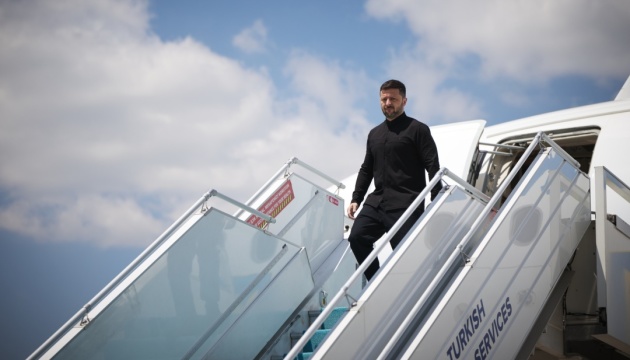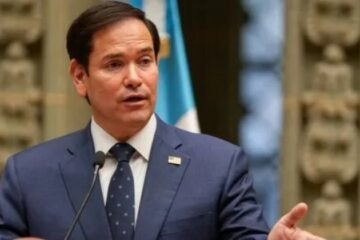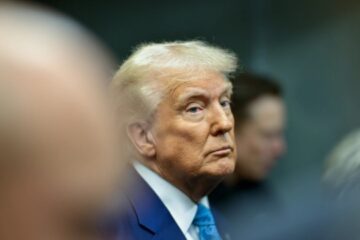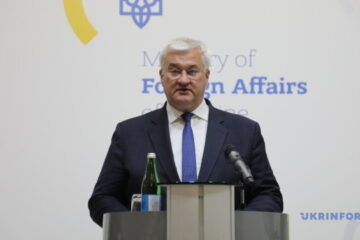
While Kyiv is betting on a clear and well-balanced position, Moscow continues its “performance for Trump,” aimed to imitate the negotiation process
Istanbul, May 15, 2025. The events of that day were more reminiscent of a chaotic theatrical rehearsal than sincere peace initiatives.
Russia, as before, demonstrates complete disregard for the diplomatic process. Instead of participating at the highest level, Putin has sent a second-echelon delegation to Turkey – without a single political “heavyweight” included – led by Medinsky, the head of the Writers’ Union of the Russian Federation, who also led the Russian team to the previous negotiations in Istanbul in 2022. The Kremlin is explicitly hinting: we are not concerned about your attempts, we continue playing by our own rules. Medinsky’s statement about his readiness “to compromise, but we want to eliminate the root causes of the conflict during negotiations” once again reveals this destructive approach, because Moscow traditionally disguises its absurd ultimatums behind these “root causes”.
Against this background, the Ukrainian delegation looks like a model of political responsibility. President Volodymyr Zelensky arrived in Turkey personally, leading a team of key security officials and diplomats, among them [Minister of Foreign Affairs] Andrii Sybiha, [Head of the Presidential Office] Andrii Yermak, [Minister of Defense] Rustem Umerov, [Chief of the General Staff of the Armed Forces of Ukraine] Andrii Hnatov, [Chief of the Security Service of Ukraine] Vasyl Malyuk. Ukraine demonstrates maximum openness to dialogue, a desire for peace, along with a clear awareness of the limits of the attainable. Kyiv also firmly articulates its red lines: no concessions on issues of sovereignty and territorial integrity. Moreover, the readiness to delegate the Minister of Defense, even to negotiations with obviously sham Russian delegation, leaves no reason to accuse Ukraine of disrupting the process. Ukraine is consistently and flawlessly doing its part of the work, the work for peace.
Political scientist Yuri Bohdanov assesses the situation as follows: “Today we saw a demonstration of another imitation of the negotiation process by Russia. Its goal was not to achieve any results, but to publicly humiliate the Ukrainian delegation and frustrate constructive dialogue.” According to him, the position of the Ukrainian President and diplomatic team, who “made a pause in response to Russian signals,” is “absolutely justified and well balanced.”
Mr. Bohdanov comments: “The President arrived in Ankara, where he held an important meeting with Erdogan. Obviously, both the Turkish leader and the Trump administration insisted that Ukraine negotiate in the proposed format, and President Zelensky yielded to their request. The decision to delegate Defense Minister Umerov to the negotiation process, in particular to negotiate a ceasefire, seems logical.”
At the same time, diplomat Vadym Tryukhan sees deeper motives behind the Kremlin’s actions: “It appears that that Putin feels his absolute impunity and omnipotence. He doesn’t care not only about Ukraine, not only about Europe, but also about the United States of America and Trump.”
According to Tryukhan, the sending of the delegation led by Medinsky indicates several things. “First, it is about a return to talks of March 2022, that is, to attempts to impose a de facto capitulation on Ukraine. This is not a consent to conducting a full-fledged dialogue, but a signal of the intention to dictate one’s will from a position of force,” the expert notes. Secondly, this is “a gesture addressed to Trump – an attempt to satisfy him, so that, relatively speaking, the Kremlin’s initiative is “counted” and to avoid the “bone-crashing” sanctions announced by Republican Senators. And thirdly, this is “another attempt to play for time” as the Russian military is preparing for an escalation of hostilities.
The analyst believes that the Ukrainian side responded appropriately, “having demonstrated openness to dialogue, thus depriving opponents of any grounds to accuse Kyiv of alleged “inability to compromise.”
The U.S. position will decide everything
The role of the United States and Trump personally in this party remains crucial and the most unpredictable both and at the same time. And here’s why: “I am not disappointed in anything. I know nothing about delegation. I haven’t even checked,” Trump told reporters aboard Air Force One, in response to a question about the composition of the Russian delegation for the Istanbul talks.
Policy analyst Ihor Reiterovych suggests that Trump “to put it mildly, did not fully understand what exactly was happening around the negotiation initiative”. The analyst explains this by the American leader’s possible “euphoria” over his other international visits, in particular to Saudi Arabia. “When, in this state, he is asked about serious topics – Russia, Ukraine, negotiations – it is clear that it is difficult for him to instantly change his mood. Hence the vague and not very specific answers”, – Reiterovych says, adding that “it cannot be ruled out that that tomorrow morning new statements from Trump will come, more meaningful and tied to reality”.
Ukraine, according to Reiterovych, has demonstrated an “explicit and calculated” position: “President Zelensky arrived in person, delivered key messages, made it clear to both Russia and the West that Ukraine is ready for dialogue, but not at any price,” the political scientist emphasizes. He also noted Zelensky’s “delicate diplomatic trolling of Trump, saying that “Trump’s position is to put pressure on both sides. I believe that we were put under more pressure”. As regards Europe, according to Reiterovych, Zelensky has sent a clear message: ‘Get ready to impose new sanctions, because there is no great optimism about the results of this meeting’. And this is a well-grounded assessment.”
Defense analyst Mykhailo Samus urges not to rush to conclusions before Ukraine’s and Russia’s delegations meet at the negotiating table. “The calculations of the parties, basically, are clear. Russia is set to continue the war. Ukraine is set to cease fire,” Samus argues. The top intrigue, in his opinion, is whether the U.S. administration will “put pressure on Russia.” The expert believes that the success of the current efforts depends on this. “If, before the start of the negotiations, or directly during them, the U.S. sends a clear message to Moscow: ‘If you do not agree to a ceasefire, tough steps will be taken,’ then the situation may change,” the analyst suggests, referring to the possibility of U.S. sanctions being toughened. Failing this, Russia “will once again play the imitation of the ‘peace process,’ dragging out the time for its new offensive campaign in the summer.” He reminds that “the ball is currently in Washington’s court,” because it was back on March 11 when Ukraine and the United States recorded in writing their readiness for an unconditional ceasefire.
Yuri Bohdanov agrees on the need to ramp up pressure on the Russian Federation: “Should these negotiations do not result in a real ceasefire, Ukraine must step up coordination with European partners… Together, we must pressure Trump into a decision to levy more sanctions on Russia and shore up military support for Ukraine.”
As regards Europe, Mykhailo Samus praises its efforts (the 17th package of sanctions), but admits that “in absence of support from the United States, Europe is physically unable to impose a real embargo on the export of crude oil from Russia.” This once again underscores the decisive significance of the U.S. position.
What is ahead?
The main question remains: how the Istanbul round of talks will end (or whether a substantial talk will begin at all). As mentioned above, the head of the Russian (sub-)delegation, Medinsky, has already stated that the Kremlin views the negotiations “as a follow-up to the peace process interrupted in 2022,” and that “the goal of the direct bilateral negotiations is to achieve a long-lasting peace by eliminating the root causes of the conflict.” Kyiv, as observers note, views such an approach as Moscow’s attempt to return to discussing the terms of surrender.
Ihor Reiterovych suggests an explicit Ukrainian plan: “The only strategically appropriate position for Ukraine is to raise the issue of a ceasefire immediately from the first minute of the meeting. Without any preconditions.” If Russia starts to evade or put forward unacceptable conditions, Ukraine should be ready to “publicly withdraw from the negotiations, with the statement: ‘We were expecting to talk to responsible people, but got a mess instead.’” According to the expert, it is crucial not to give Trump a reason to accuse Ukraine of disrupting the process. “On the contrary, we are ready, we came, we talked, but the opposing side staged a clownery instead of bringing a meaningful delegation.”
Vadym Tryukhan is less optimistic about the role of the U.S.: “It seems that Washington is not ready to raise the stakes in the big geopolitical game. There is a pathological fear of a direct confrontation with Russia, and therefore a strategy of pretense has been chosen, like ‘everything is proceeding to plan.’” The expert does not rule out that “tomorrow, Trump will publish a new post on social networks praising the negotiations as a ‘success’.” However, Tryukhan emphasizes, “the reality on the battlefield is drastically different now. Russia still retains enough resources to continue the war.” Therefore, the main task for Ukraine now is to “activate and expand the Coalition of the Willing, work with the American side to demonstrate that Putin is actually deceiving Trump. And most importantly, prepare for defense, because Russia’s summer offensive campaign has already got underway.”
Yuri Bohdanov, too, has no illusions: “Putin has no intention of negotiating, but instead is playing out a show of negotiations, while continuing his war of aggression until his resources are completely exhausted.” The expert anticipates that “there are still lots of diplomatic seesaws ahead. But we must travel this path with dignity, consistency and with a cool head.”
Conclusion notes
That day in Istanbul once again confirmed the old truth: it takes two to tango, suggesting that peace can only be achieved with a true desire from all interested parties. The only certainty is that Ukraine has made every effort to demonstrate to the world its desire for a just peace. Now word rests with other actors in this complex geopolitical drama. The composition of the Russian delegation, their rhetoric and the experience of previous “negotiations” leave no room for optimism. Much will therefore depend on the position and determination of the United States, which has in its arsenal powerful levers to influence the Kremlin. Tomorrow will dot the i’s and cross the t’s. Or will it?…
Myroslav Liskovych. Kyiv
Source: What does Russia aim by staging a show of negotiations in Istanbul?



